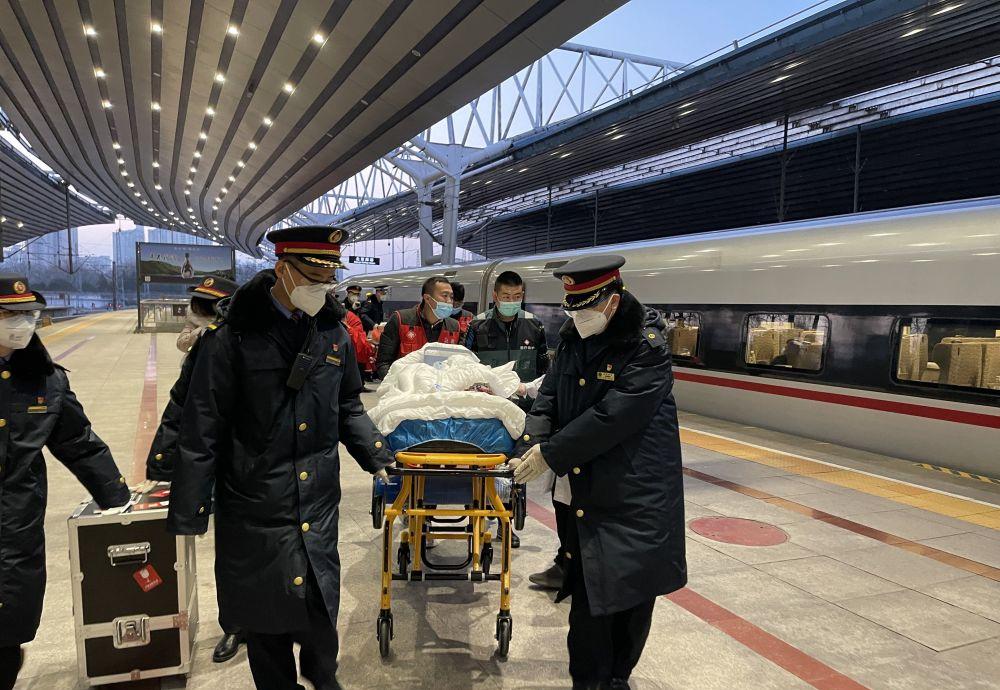Beijing News (reporter Guo Yimeng) On December 24, a reporter from the Beijing News learned that a rare disease child who was transported during the evening peak in Beijing two days ago has been admitted to the Children's Hospital Affiliated to the Capital Institute of Pediatrics and is receiving further treatment.

At 5:01 p.m. on December 22, G80 arrived at Beijing West Railway Station, and the staff helped transfer Xiao Jingyi. Beijing News reporter Li Yang photographed
On December 22, Xiao Jingyi, who suffered from spinal muscular atrophy (SMA), traveled from Changsha to Beijing by high-speed train G80 for treatment. Since the G80 arrived at the evening peak of Beijing, the Beijing traffic police and volunteers from Beijing Volunteer First Aid opened the way for the ambulance transporting Xiao Jingyi. With the help of a large number of staff, the 12.7-kilometer journey from Beijing West Railway Station to the Children's Hospital Affiliated to the Capital Institute of Pediatrics took only 16 minutes and 38 seconds to transfer ambulances.
On the afternoon of December 23, Xiao Jingyi, who had undergone various examinations, was admitted to the respiratory medicine ward of the Children's Hospital Affiliated to the Capital Pediatric Research Institute. Xiao Jingyi's father, Liu Kuichen, told the Beijing News reporter that on the day of the transfer on the 22nd, the child's heart rate reached 190 beats per minute twice on the road, and now the situation has stabilized. "It's more specialized, with departments and beds dedicated to this disease."
Cao Ling, director of the Department of Respiratory Medicine, said that at present, Xiao Jingyi's vital signs are relatively stable, and there is some significant increase in heart rate, and follow-up needs to further evaluate the situation of nerves, cardiovascular, digestion, nutrition and other aspects, and treat them through multidisciplinary management. Although SMA mainly involves the muscles in charge of exercise, but the whole body multisystem function will also be affected, such as swallowing disorders, respiratory dysfunction, digestive dysfunction, skeletal aberrations, etc. In the use of a variety of drugs at the same time, respiratory management is the first and most critical level.
According to Cao Ling, Xiao Jingyi has drug-resistant bacterial pneumonia, spinal muscular atrophy leads to respiratory muscle weakness, especially during the infection period, he can not effectively maintain blood oxygen saturation, and needs a ventilator to assist breathing. At the same time, Xiao Jingyi can not discharge the secretions in the airway, so after each use of atomization pump, vibrating sputum discharge, position drainage treatment, it is necessary to use a sputum coughing machine and suction sputum through the mouth and nose. Respiratory failure can be alleviated through careful respiratory management plus antimicrobial treatment.
At 17:39 on the evening of December 22, Xiao Jingyi was transferred from an ambulance into a rescue room in Area B of the Children's Hospital Affiliated to the Capital Institute of Pediatrics. Beijing News reporter Li Yang photographed
Liu Kuichen said that Xiao Jingyi is currently doing rehabilitation treatment, and the child's mother is accompanying the child. "The child is cared for by the mother and is not as fearful as before in the intensive care unit."
The China Social Welfare Foundation has launched a fundraising for Xiao Jingyi, and as of press time, more than 230,000 yuan has been raised. Liu Kuichen told the Beijing News reporter that the foundation has sent an official letter to the hospital, and at present, the family does not need to pay money, and the cost of Xiao Jingyi's treatment is directly allocated from the charity.
Spinal muscular atrophy (SMA) is a neuromuscular disease caused by defects in the function of motor neuron survival gene protein caused by mutations in motor neuron survival gene 1 (SMN1), which is a hereditary neuromuscular disease that is more common in childhood, with an incidence of one in 10,000 in newborns, caused by damage to motor nerve cells in the anterior horn of the spinal cord, mainly manifested as progressive muscle weakness and muscle atrophy of the lower limbs.
It is understood that Xiao Jingyi belongs to the SMA-I. type, most of these children have the onset within 6 months, the disease progresses rapidly, and it is impossible to achieve large actions such as sitting alone, turning over, climbing, etc., and will often involve breathing and swallowing as the disease progresses.
Edited by Liu Qian
Proofread by Wu Xingfa